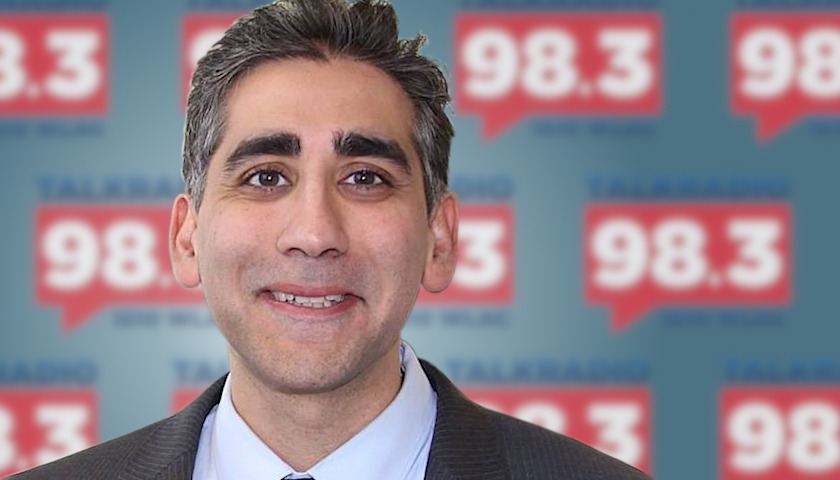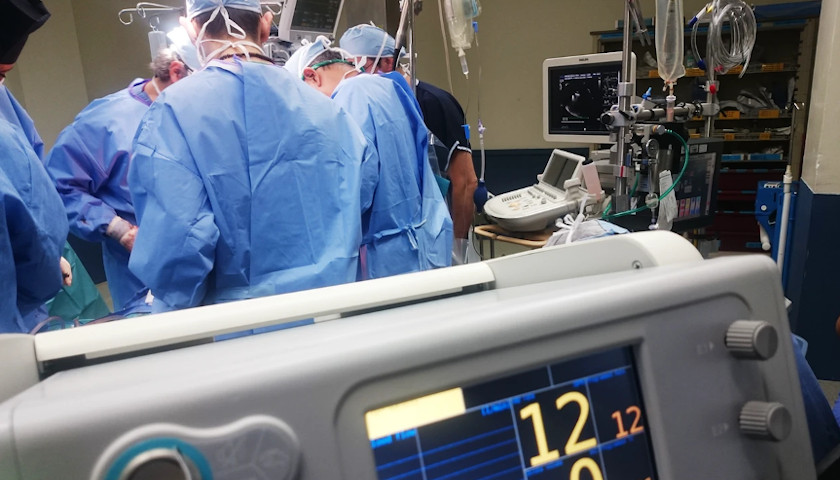On Monday’s Tennessee Star Report with Steve Gill and Michael Patrick Leahy – broadcast on Nashville’s Talk Radio 98.3 and 1510 WLAC weekdays from 5:00 am to 8:00 am – Gill and Leahy chatted with My Healthy Tennessee founder and Tennessee native, Dr. Manny Sethi, about his non-for profit community based health care fairs. The men discussed the current situation for Tennessee’s healthcare, it’s fiscal downfall, and accountability of patients.
Sethi stressed throughout the segment that there was a great need to “re-think” the current healthcare delivery standard.
Gill: Everybody’s had their new year’s resolution’s now at play for a week or so. You know the gyms have been packed. By next week you’ll be able to shoot a canon in the gym and not hit anybody. But everybody starts the new year with a commitment to you know better fitness, better nutrition, better health. And we just thought we would at least help you go into yet one more week of trying to stick to that commitment. Dr. Manny Sethi has launched a website, MyHealthyTennessee.com, it’s a non-profit that he and his wife, Maya founded in 2011 to promote healthier living, healthier lifestyles. They’ve done dozens of health fairs across the state. They recently announced Healthy Tennessee University that’s going to focus on youth participants. And now he’s doing Rounds with Dr. Manny that focuses on the opioid crisis. They are going to be doing an event down by Manchester, Tennessee which is near his hometown of Hillsboro before he went off to medical school and is now an orthopedic surgeon over at Vanderbilt. Manny good to have you with us!
Sethi: Hey, good morning Steve thank you so much for taking the time. Boy Michael, appreciate ya’ll having me on.
Gill: I feel like I’m doing great on my new year’s resolution. We are into week two and I haven’t done anything horribly bad. I’ve completely kicked the whole meth habit. Not going to do the opioid stuff anymore. I still do run by Krispy Kreme donuts a lot more than I should.
(Laughter)
Sethi: Ahhhh, that’s ok. You know I just think it’s all about basic small changes you know? You don’t gotta knock it out of the park just you know try to walk a little bit every day. Just try to focus on your diet a little bit. Cut down sugar. And just you know these basic very small things about activity and nutrition. You know small changes can really give you big results over time. But you know, I really appreciate ya’ll having me on to talk about Healthy Tennessee today.
Gill: You know one of the things that we hear so much about in kind of the health care policy arena Manny is that it’s all about health insurance all the time. And your all’s focus is more on healthy living, healthy lifestyle, and better health rather than who pays for it when we have problems.
Sethi: You know that’s totally right Steve. You know, the Democrats basically talk a lot about health insurance and how health insurance will solve these problems that we face in American healthcare and Obamacare. But the issue is, is that until we get healthy I think we’re going to have trouble. And that’s why we founded Healthy Tennessee about eight, nine years ago. When I came back home, I realized that right now in Tennessee about 15% of our folks have diabetes, fifteen percent of us smoke, obesity is at about forty percent. We’re spending about forty percent of our state budget on TennCare. So we’re not building roads. We’re not investing in our schools and the next generation. We’re just paying for these problems that we’re taking care of on the backend of diabetes of obesity. When if we just change behavior on the front end we could really do a lot and save a lot of money and invest in future generations of Tennessean’s. So what we started doing were these small health fairs. The first one we had was in Manchester. You know I begged all my folks, I’m a trauma surgeon at Vanderbilt, and I begged all these nurses and folks to come out and doctors and help out to really educate folks about the benefits of living a healthy lifestyle. So let’s say, Steve, you came into our health fair in Manchester you know there’d be a doctor a nurse who’d spend about forty-five minutes with you and they’d talk to you about your own labs and do a basic exam, and about how you can get healthier. Now over time, as we started doing these, they just started growing. And people came out of the woodwork to help and then you know suddenly we had patients on the average of four to five hundred per place we went and it just has organically grown. But what I’m very proud of at Healthy Tennessee is the fact that look, we are talking about getting on the front end of this problem through living a healthier lifestyle. Through making small changes like I mentioned in your nutrition and your fitness. And if we just could get healthier we could save so much money on the front end. And I think, that’s the power of Healthy Tennessee is through engaging local communities at these fairs. And it’s the local folks. It’s boots on the ground, nurses, doctors, other healthcare providers who are coming out to just help people. Because in Tennessee it’s all about people helping people.
Leahy joined the conversation by asking Dr. Sethi how he had the time to do Healthy Tennessee. Sethi graciously thanked Leahy and confessed that he believed it was his true calling. As a son of two doctors, he’s seen the critical necessity in healthcare, the hands-on care of his parents, and that the problems people face must be handled on the front end instead of the back end. Gill concurred stating that diabetes is the costlier health issue we face in America and that people can move from diabetic simply by changing their lifestyle. Sethi agreed to state that the whole mission and purpose of healthy Tennessee is to initiate dramatic changes through lifestyle choices, education, and engaging the local communities with local personal solutions. He noted that he was additionally proud of being able to bring health organizations together across the state.
Leahy: Dr. Manny Sethi, you are from Tennessee but you completed your general surgery internship at Mass General Hospital in Boston and you were a resident at Harvard’s combined orthopedic surgery program. That’s pretty high-level medicine. Why’d you come back to Tennessee?
Sethi: Well you know, Tennessee made me who I am. Look my parents were immigrants and they came to America for a new life. I’ve lived the American Dream in Tennessee. You know I was born and raised here. Grew up in Hillsboro and Tennessee did so much for me. And as I grew older, especially when I lost my father about fifteen years ago you just start thinking about your life and what it means and when I think about who I am. I think about Hillsboro, Tennessee and all those folks from the community who came together to help me and so that’s why I came home because I wanted to give back. As an orthopedic trauma surgeon you know I thought I was doing that. But as I looked around at these healthcare problems. You know I’d talk to these politicians, I’d say: “Look this is what’s happening.” And I’d just watch their eyes glaze over. And my wife, you know she’s known me since we were sixteen years old. One day she said: “Look, you’re a doer. You need to get out there and go fix this problem.” And so that’s what we did. County by county. City by city. Over eight years we’ve been trying to make Tennessee healthier. Because I believe that if we are spending forty percent of our state budget Steve on these problems it is not sustainable.
Gill: Well when you look at the personal accountability angle that you all are focused on with My Healthy Tennessee (and folks can go to MyHealthyTennessee.com on the web to find out more details) you’ve also got kind of some big budget items. You’ve got the folks in the healthcare industry who profit from the system as it is who are pushing to make sure that we’ve got full on hospitals in every rural community across the state so that there’s a cancer treatment facility in maybe all ninety-five counties and that there’s are full surgery units in all ninety-five counties. That’s not necessarily the best way to deliver healthcare.
Sethi: Yeah and in the future I think it’s going to be very difficult to do some of that, and we’ve got to re-think healthcare delivery. Let me give you an example. Our events. We have these community health events where we can see patients for less than say five dollars a person. Now imagine, we are able to do labs, we are able to do screening.
Sethi concluded the segment by stating that we have to rethink healthcare delivery. Accountability was another issue Sethi stressed but believed that it can be fixed with personal care and that over time one could change their behavior. “The average time per patient that we spend is forty-five minutes. Now would you rather go to a community event where there’s easy parking, there’s not a big wait, it’s a fun atmosphere. Or would you rather go to a sterile primary care office and wait in a line etc.” said Sethi.
Sethi reflected upon his father’s words of wisdom, “Son, people don’t care what you know until they know that you care.”
Listen to the full segment:
– – –
Tune in weekdays from 5:00 – 8:00 am to the Tennessee Star Report with Steve Gill and Michael Patrick Leahy on Talk Radio 98.3 FM WLAC 1510. Listen online at iHeart Radio.






This was an excellent interview. Dr. Manny Sethi is working to get Tennesseans involved in taking charge of their own healthcare with preventative measures conducive to good health. That’s a true conservative approach, making healthcare a matter of personal choice and action without government interference.
Liberals assert that healthcare is a right. I agree. It can be included as one of the non-enumerated rights in the 9th Amendment. But rights belong to the People which means it cannot be managed, controlled or mandated by government. For that reason, Obamacare is unlawful. Dr. Sethi is working to get people to exercise their right to manage their own healthcare.
Dr. Manny Sethi. . .Dr. Manny Sethi. where have I heard that name before? I wonder if he’s up to anything other than the efficient delivery of healthcare? If so, that’s O K – so long as we conservatives are prepared to ask the right questions and listen carefully for the right answers.